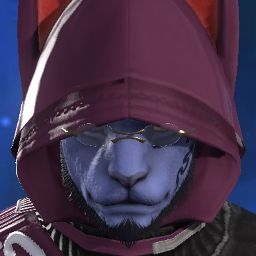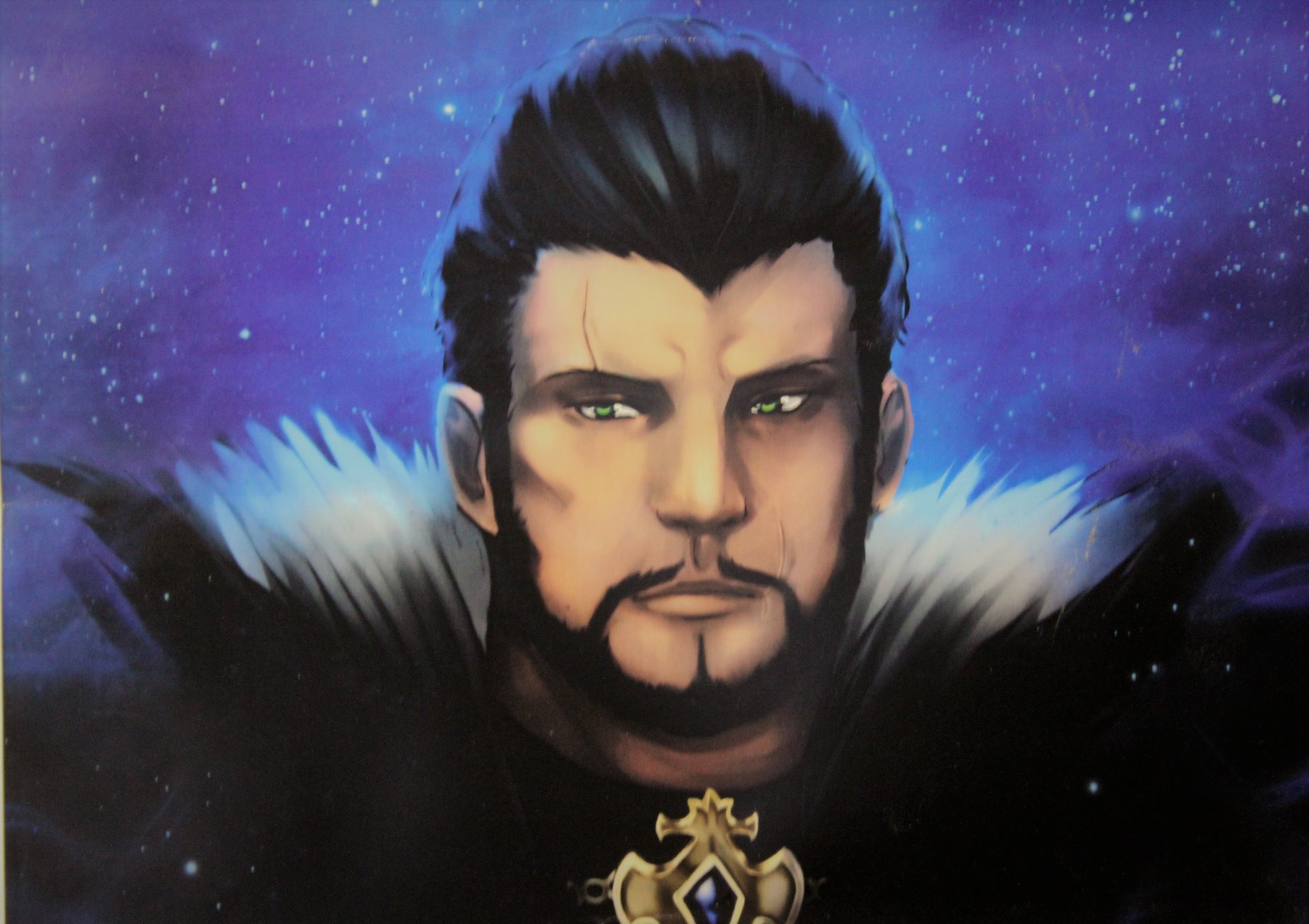It only works due to Alexander himself. If when he sealed himself in stasis, he also caused a permanent time loop with himself (meaning he himself is keeping the loop going), then there is no paradox due to his own powers preventing a paradox from happening to begin with. It's going to keep happening because it's a closed time loop, a time loop that only works because of Alexander's way of altering time. Think of it as...a loop de loop. Time is going around in a circle with him, things keep happening in its closed circuit. Us going back and saving ourselves is a mini-loop within the loop.
-
09-29-2020 03:11 PM #241Player

- Join Date
- Oct 2013
- Location
- New Gridania
- Posts
- 5,465
- Character
- Hayk Farsight
- World
- Exodus
- Main Class
- Dark Knight Lv 100
(1)
-
09-29-2020 03:23 PM #242Player

- Join Date
- May 2015
- Location
- Valnain
- Posts
- 827
- Character
- Wind-up Antecedent
- World
- Zalera
- Main Class
- Rogue Lv 100
Then we're getting into the nebulous territory that is retroactive continuity. That's a whole kettle of fish unto itself.
This sounds wrong to me. What should happen is this: There exists Timeline A, in which we narrowly avoid getting killed by Alexander due to his stopped time ending early. In this timeline we attempt go back to the point at which he stopped time. From here the timeline diverges. In timeline A, we succeeded in traveling back in time, and thus were able to save our past self. In timeline B, we never traveled back in time, and thus... died. I'm pretty sure the party wipes when this happens. But in actuality, this is even more complicated than it first seems.If we assume that travelling back in time creates a split, then we start in timeline A, travel back to create timeline B, save ourself.... but if our second self only existed in timeline B then we never appeared in timeline A to save our younger self so we could go on to be the older self who travels back.
See, Alexander sent his own minions into the past before we went into the past, meaning there's three timelines: One where Alexander's minions arrived in the past, followed by us, one where Alexander's minions arrived in the past, but we didn't, and one where nobody arrived in the past. In that timeline, Alexander's time stop never started to begin with. I think I prefer that one, 'cause I'm gonna be frank: I don't think the way the Alexander raid incorporates time travel (namely, its use of causal loops) was particularly well written or consistent to begin with.
To explain using this same example: The Primal Alexander is established at the end of the raid as being a supercomputer with time travel capabilities far in excess of what it displays. It successfully determined that it was capable of changing the past. The example I recall being given was that it could prevent the Seventh Umbral Calamity from happening by defeating Bahamut on its own. It instead determines that doing so would be far more detrimental to the future of the world it was summoned to protect, and further determines that the best use of its abilities is to minimize its presence in reality while setting into motion the very events that will ensure it came into existence. To wit: The causal loops exist because Alexander willed them to be, not because Alexander was incapable of changing the past.
Now going back to the causal loop of "Alexander stops time by sending his minions to the past, we go back to the past to unstop the stopped time, thus leading our survival and ability to fight Alexander in the raid in which he sends his minions back into the past to stop time"... there is a message that is only displayed to the party members who didn't go back in time during that mechanic.
This message only appears when the mechanic is successfully cleared and can only be seen by players who are still in the present, meaning that it's happening in the present. The very Alexander that sent his minions into the past is confused that it failed, and can't determine how this is possible. This is the case even though this Alexander exists within a future where it already knew it failed from firsthand experience. If this action exists in a causal loop, Alexander should be aware of this and not be surprised. But even further than that, if it was meant to be a causal loop then it shouldn't have happened in the first place. Alexander accomplishes nothing by doing this other than wasting aether, something he is supposed to be trying to avoid.ALEXANDER PRIME
Temporal reconfiguration aborted... Insufficient data... Insufficient Data...!
If there's split timelines here, then we have contend with the knowledge that there's a timeline where Alexander intentionally tried to cause a consistency paradox and apparently succeeded. If you're having trouble envisioning what that would look like, you're in good company, because I can't explain it either. But at least that timeline is (apparently) self-terminating. There also should be a timeline where nobody arrived in the past, which would presumably lead into a superficially similar scenario in which we fight Alexander, and he attempts to send his minions back in time—this is giving me a headache now. But I'll definitely agree that split timelines don't work with the Alexander storyline. Thanks to Alexander's rampant use of time travel, timeline splitting stops being the cleanest solution and instead becomes... All the Myriad Ways messy.
So then what if we changed the past, resulting in the future where Alexander succeeded never coming to pass? I can't think of a problem inherent to this solution, save for the fact that it doesn't line up well with the causal loops earlier in the story.
Heck, there's an actual line in the Alexander questline that I feel illuminates exactly what I hate so much about the Alexander questline.
This is supposed to be a story about human determination and choosing our path forward, but the whole thing falls apart without the literal Deus Ex Machina known as Alexander, God of Time, pulling everyone's strings to make sure nobody breaks anything. Including his own strings, without himself realizing it!MIDE
You poor, deluded fool. You never did work it out, did you? The future doesn't choose us─we choose the future.(0)Last edited by Rosenstrauch; 09-29-2020 at 03:39 PM. Reason: Alexander hurts my soul.
-
09-29-2020 04:49 PM #243Player

- Join Date
- May 2014
- Location
- The Interdimensional Rift
- Posts
- 3,600
- Character
- Vicious Zvahl
- World
- Excalibur
- Main Class
- Machinist Lv 100
This is a lot harder to read when your own name is Alexander >_>;
I guess I would add, when you fail the time travel mechanic in the raid, when you are in the time portals themselves, then you literally see yourself along with Cid and the others get hit by Sacrament and dying(even though even at current times i240 with all things accounted for, one hit of Sacrament was non-lethal to the WoL within the context of the fight).
You can also note that when Alexander sends his, "faithful" to the past, he refers to it as, "To free these souls from the prison of time." I guess the dead in the world of FFXIV exist outside of time? Or at least, the aetherial sides of the realm?
As for Catboi Sage Deluxe and his time shenanigans... I'll have to replay Shadowbringers first. There's too many details I don't remember in regards to the reasons why and how they sent the tower back to the First but didn't know to account for the time lag between the separate physical planes that the shards are on... or may be on. Time travel aside for a second, I'm still unsure on whether or not the shards are in the same physical space, like in the same elliptical as the Source, or what.(1)
(Signature portrait by Amaipetisu)
"I thought that my invincible power would hold the world captive, leaving me in a freedom undisturbed. Thus night and day I worked at the chain with huge fires and cruel hard strokes. When at last the work was done and the links were complete and unbreakable, I found that it held me in its grip." - Rabindranath Tagore
-
09-29-2020 04:56 PM #244Player

- Join Date
- Mar 2011
- Location
- Ul'dah
- Posts
- 3,079
- Character
- Rannie Lfey
- World
- Faerie
- Main Class
- Red Mage Lv 100
(7)I have a secret to tell. From my electrical well. It's a simple message and I'm leaving out the whistles and bells. So the room must listen to me Filibuster vigilantly. My name is blue canary one note* spelled l-i-t-e. My story's infinite Like the Longines Symphonette it doesn't rest- TMBG Birdhouse in your Soul
A huge THANK YOU!!!! For FINALLY selling the Meteor Survivor Polo on the store. AND a huge thanks to my friend who bought it for me while he was at Fan Fest!!! YES I finally have my POLO!!!
-
09-29-2020 05:16 PM #245Player

- Join Date
- May 2014
- Location
- The Interdimensional Rift
- Posts
- 3,600
- Character
- Vicious Zvahl
- World
- Excalibur
- Main Class
- Machinist Lv 100
I'll paint a picture for you. The beams flood over the character models, which fall over into their death pose. The screen then goes black and the instance resets. When you're with Alexander Prime still, you get a different text bubble and he casts something I think that insta-kills everyone. It's beeeeeen a looooooong time since I've seen both fail states.
(5)
(Signature portrait by Amaipetisu)
"I thought that my invincible power would hold the world captive, leaving me in a freedom undisturbed. Thus night and day I worked at the chain with huge fires and cruel hard strokes. When at last the work was done and the links were complete and unbreakable, I found that it held me in its grip." - Rabindranath Tagore
-
09-29-2020 10:11 PM #246Player

- Join Date
- May 2015
- Location
- Valnain
- Posts
- 827
- Character
- Wind-up Antecedent
- World
- Zalera
- Main Class
- Rogue Lv 100
It may just be a cost-cutting choice, but from what I've seen the First and the Source have the same skybox at night. This is most visibly apparent on nights with clear skies. The moon follows the same trajectory and is always in the same phase, too. But the same is true for the Far East—if the devs weren't willing to create variable time zones and different skyboxes for different areas on the globe due to it not being worth the cost of doing so, I can't blame them for not doing the same for a different world.
(2)
-
09-29-2020 10:29 PM #247Player

- Join Date
- Dec 2013
- Posts
- 3,822
- Character
- Lineage Razor
- World
- Gilgamesh
- Main Class
- Goldsmith Lv 90
Working from a single-timeline perspective, if you assume that multiple realities and branching timelines are impossible, then the only way time travel can work is if time travel doesn't change anything - the most it can do is ensure events proceed as they have already proceeded. When time travel is used in this way, it is clean and not messy at all. There are no paradoxes (bootstrap paradox is a misnomer). There is no "before the time travel happened, things actually happened this way", because time travel has ALWAYS been a part of the timeline. It's like a roller coaster with a loop in it - the roller coaster didn't used to be flat and they added the loop later. The loop was always part of the design.
G'raha's time travel basically threw what we knew about time travel out the window. Or, at the very least, it introduced more things that it can do. I think that we can still assume that self-perpetuating time loops like Alexander's still exist, and do not spin off additional timelines since they do not introduce paradoxes. But now we know time travel CAN effect change, and when it does then a new timeline is generated, branching off the original but leaving the original intact.
Honestly, I think this was a bad genie to let out of the bottle. It takes a lot of the tension out of things if we know that, no matter how terrible things get short of total planetary destruction (and maybe even then), we can just wait until folks figure out time travel and then go back and fix things. Never mind that the way they managed it this time was nothing short of a miracle of merged technologies and circumstances - the fact that it's possible at all means that, in the fullness of time, someone can figure out how to do it again.
Introducing multiple worlds also runs into the problem of trivializing our own accomplishiments. Particularly true in the scenario of an infinite multiverse (what does it matter if we won here, if we failed in ten billion other timelines?), but even in this case where there's only two timelines: All of our work to stop the Ascians? Great for us - but in the "bad future" their plan is apparently still right on track, given that life on the Source is apparently NOT going to be extinguished (and it's debatable whether that would have stopped the Ascians' plan even if it was), and civilization is slowly beginning to recover (just as it has for all of the Ascians' previous Calamities).
I see the point that Alexander as a deux ex machina isn't much better - if he's playing us all like puppets, then what's the point of anything we do? Where is our free will if everything we do was determined by Alexander? That's a philosophical debate centuries old (just replace "Alexander" with "the Christians' omniscient and omnipotent God"). But if we treat a single timeline as a future we forge for ourselves as we move toward it, we have to bear in mind that there are other people forging it right along with us. These people interfere with each other and us all the time, and we do not always have full control of our destiny as a result. Alexander is just one other such person, and while he had capabilities that gave him a great deal of ability to interfere, ultimately his interference came to an end. So, Mide was not wrong - the future is something we choose. But you have to remember that Alexander is part of the "we" doing the choosing.(2)
-
09-30-2020 12:30 AM #248Player

- Join Date
- May 2015
- Location
- Valnain
- Posts
- 827
- Character
- Wind-up Antecedent
- World
- Zalera
- Main Class
- Rogue Lv 100
The problem with this line of thinking is that this isn't how time travel works even in the Alexander raid.
DAYAN
...Their fate was not mine to change, Mide. All that came to pass did so for a reason. History is as it was─as it should be─free of the paradoxes that spelled its undoing.
From this place─unfettered by the mortal construct of time─Alexander looks out upon past, present, and future, seeing infinite possibilities. I see what it sees, and feel what it feels─this perfect machine, born from yearnings for an ideal world.
Oh, if you could see the worlds we have seen! A world in which the Illuminati rule history with an iron fist, every nation brought under their yoke. A world in which Alexander spread wide the wings of time and swept the lesser moon from the heavens, averting the Calamity...
Alexander dreamed all the realities imaginable─all the realities mathematically computable─and in the end, reached a single, logical conclusion. It would change nothing, and erase itself from existence.DAYAN
Alexander possesses the power to travel through time and space, and reshape history for the better─but such power comes at great cost. The sheer quantity of aether consumed in the process means that Alexander itself would─mayhap not immediately, but inevitably─bring ruin to this world. This perfect machine, this supreme manifestation of logic and science, deemed its own existence a threat.
And so it chose to do nothing. To leave history untouched, and the future in the hands of man, with all his imperfections. Such was Alexander's divine judgment.
A time will come when the fate of this world is placed in the hands of one warrior. For reasons hidden to me, the future from that day forth remains shrouded in mystery─beyond even the colossus's ability to calculate. And yet Alexander chose to believe in that woman, and the light within her.If this is supposed to be a story in which there's a single, immutable timeline which can never be changed by time travel, then Alexander's own observations are impossible. From its position outside of time, it should only see a single, unbroken line. A past that always was, a present that always is, and a future that always will be. But it doesn't—it sees infinite possibilities and recognizes its own power to alter the course of time at any point of its choosing. It also recognizes that there are paths time can take that don't make logical sense—it instead results in paradoxes. And finally, it recognizes that failure to act would invariably result in the Illuminati screwing up everything to the point of ushering in a Calamity. This should not be possible if the timeline is immutable—it should instead only be able to perceive the Illuminati's failure.DAYAN
There was but a single time Alexander was spurred to action─not to change history, but to preserve it. The summoning of the colossus, and the events that followed, had potentially disastrous consequence for our reality. Its fabric strained to accommodate an infinite number of potential futures separated by nary a thread.
Were the wings of time to fall into the hands of the Illuminati, the repercussions would be dire indeed. History would be rewritten over and over again, each time bleeding the land of aether. And in the end, the colossus would usher in another calamity.
To prevent this tragedy─to preserve the circle of time as it had already been set in motion─Alexander sent forth a humble servant to do its bidding.
A clockwork coeurl, an eternal child, to gently nudge history back onto its proper path.
Alexander also, apparently, has a massive blind spot when it comes to any possible future involving the WoL where they don't die before arriving at an unspecified point of time in the future. From that point forward, Alexander's ability to perceive the future stops working entirely. It can't see infinite possibilities. It can't see one. It can't see none. What it sees is undefinable—and despite this completely unknowable future being at the apparent end of the path in time it chose to preserve, it does not deviate from this course out of faith in the WoL.
... the same WoL it tried to kill by stopping them in time, only to fail because the WoL traveled back in time to prevent it from changing the past, which it should have known would happen because it's trying to preserve this exact timeline, but it didn't know would happen because... reasons? Or maybe Alexander was just lying about being confused by its own failure to alter the past, for... reasons?
As an addendum, to use your own roller coaster analogy to demonstrate causal loops and why they result in the bootstrap paradox: Imagine that a roller coaster with a loop is built one day. You go to ride it and, while waiting in line, notice something odd about it. There are two carts on the track: One that goes around the full track, and one that never leaves the loop. At the point where the first cart enters the loop, it and the second cart appear to become one, and at the point where it leaves the track, they appear to separate back into two carts. At the moment in which the carts appear to be one, the riders from both carts can be observed interacting with each other.
You stop and ask "How long have they been stuck in that loop?", and the ride's manager says "I've been here since the coaster was built, and I've never seen them outside of that loop." This is the perspective outside the roller coaster, and outside of time.
You get on the roller coaster when the first cart comes to a stop. You approach the loop, and notice that there is no second cart. The loop ahead looks perfectly normal from your perspective. You go into the loop, and become capable of perceiving the second cart. The passengers are sitting right next to you. You exit the loop, and they're gone, cart and all. When the ride ends, you never return to this roller coaster again. This is the perspective of someone inside the roller coaster, but in the linear time of a "straight" timeline.
While you were in the loop, you asked one of the passengers from the second cart what it looks like to them. They say "You've always been right next to me, but every time we complete a lap in the loop, you ask me that question. Every time, I give the same answer. The loop doesn't have an entrance or an exit. We just keep going around in it." That is the perspective of someone on the roller coaster, but in the nonlinear time of a causal loop.
Now to apply that to Alexander: The WoL's past begins before the loop, and their future ends ahead of the loop. If this were to be observed outside of time, then the WoL would appear to enter the loop at its earliest apparent point, and exit the loop at its latest apparent point. But Mide is different: She exists entirely within the causal loop. If one were to observe the past and the future from Mide's perspective, they would come to the conclusion that they are one and the same: A chain of events with no beginning nor end. This is the Bootstrap Paradox.
This is gonna be my last post on the matter. I wasn't kidding when I said my previous post on the subject gave me a headache. Time travel is just that frustrating.(4)
-
09-30-2020 05:50 PM #249Player

- Join Date
- Jan 2014
- Location
- Ul'dah
- Posts
- 3,479
- Character
- Tal Young
- World
- Cerberus
- Main Class
- Gunbreaker Lv 100
I got the impression that Alex himself sits outside the timeline, if he intervenes to change something then that becomes how it always was. He's not someone on the inside altering their own past, he's an outsider messing with ours.
There is only a single timeline, but it's not completely immutable. Alex could change it if he wanted to, he just decided not to bother because all his calculations on how it'd pan out end up the same way, he has to slurp up too much aether in order to make it work and it leads to calamity.(0)Last edited by Jandor; 09-30-2020 at 06:13 PM.
-
09-30-2020 07:18 PM #250Player

- Join Date
- May 2014
- Location
- The Interdimensional Rift
- Posts
- 3,600
- Character
- Vicious Zvahl
- World
- Excalibur
- Main Class
- Machinist Lv 100
So, something else that should be considered when we battle Alexander Prime is the fact that the battle itself takes place within a singularity. In a singularity, spacetime as we know it breaks down. When we go back in time with the timegates he makes for his minions, we are still within space bound to the singularity, and said singularity is unobservable (as most are). This is why we, even as the audience, could not observe them in the cutscene where the freezetime is enacted over the central control elevator platform.
Basically, the causal loop that we logically conclude would happen within the fight does not happen, because it's happening in a spacetime distortion where the laws of causality do not apply. And all of that is happening within the Tardis-like spatial distortion that is the innerworkings of Alexander itself.
For Catboi Sage Deluxe's time travel, there are other factors at play, namely the fact that it does not happen within a double burrito supreme wrap of spatial distortions, but merely across the physical spacetime presented to us within FFXIV's universe. As far as I know, there are no singularities at play, so there's no spacetime break down. Motivations also differ, where Catboi Sage Deluxe is specifically going back in time to change history, whereas Alexander is going back in time to maintain it. There are still many factors in the overall Alexander-Mide timeloop that we are not privy too. For one, as of yet, Alexander is still in stasis in the Thaliak river as far as we know it in both the Bad and Good Timelines, meaning that any splits that occur from him going back in time won't begin until after Catboi Sage Deluxe and the Bad Future Ironworks already split the timeline. This means that Catboi Sage Deluxe's time shenanigans are still in line with the rest of the story.(0)
(Signature portrait by Amaipetisu)
"I thought that my invincible power would hold the world captive, leaving me in a freedom undisturbed. Thus night and day I worked at the chain with huge fires and cruel hard strokes. When at last the work was done and the links were complete and unbreakable, I found that it held me in its grip." - Rabindranath Tagore



 Reply With Quote
Reply With Quote






